My great-grandmother, Bertha Charipper Kessler, hailed from the Shtetl Brody. A Shtetl is nothing more than a small town or village in Eastern Europe before the Holocaust. As with other Eastern European areas, it fell under different countries at different time periods.
- Before WWI, it was part of Galicia in the Austrian Empire
- Between the two World Wars (abt 1930 – 1945) it was considered part of Tarnopol in Poland
- After 1950, it was part of the Soviet Union
- Today, it is considered part of Ukraine in the L’viv Oblast (District)
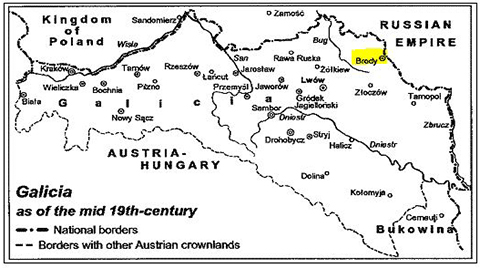
Brody is 238.1 miles west of Kiev, the capital of Ukraine and less than 60 miles from L’viv, which is in the foothills of the Carpathian Mountains. However, the land around Brody is very flat. The original name, Brod, means “ford” because the city is near the Styr River and was built where the river narrowed.
What was Brody like at the time our ancestors lived there?
As early as 1648, 400 Jewish families were living in Brody. One accomplishment of Brody’s Jewish community in the 17th century was the construction of a large synagogue. It was referred to as Brody’s “old fortress synagogue.” Although it still stands, it is no longer usable.
Toward the end of the 17th century, the Jewish quarter in Brody was destroyed by fire. Afterwards, the Jews were allowed to live in all neighborhoods of the city, to distill liquor, to engage in crafts and take part in commercial enterprises. However, in order to do these things, a tax was levied annually.
Empress of Austria, Maria Theresa, in 1780, was known to be anti-Semitic. After her death, the Austrian Government was benevolent to Jews and by 1868 Galicia’s Jews had attained equal status under the law.
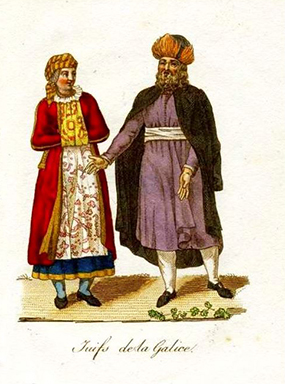
Several factors influenced the rise of poverty in Galicia. One was a railway to Odessa was built south of the city in 1848, and in 1880, another terrible fire broke out. A common saying of the time among businessmen was “failed in Brody”.
In the 1860’s, the Broder Singers (singers from Brody) began. In 1876, in collaboration with Abraham Goldfaden, the Broder Singers wrote a 2-act play. Goldfaden is now considered the father of Yiddish theater.
A rail line was built in Brody in 1862.
On March 1, 1881, the Russian Tsar, Alexander II, was assassinated. Of the 6 people arrested for this, one was Jewish, a young woman named Gessia Gelfman. That was enough to cause the Russians to vent against the Jews.
Pogroms broke out, first starting in Odessa at Easter time and then spread to about 200 other towns and cities in Russia. Jews left the Pale of Settlement with many heading to Brody, which was only five miles from the border.
In 1881, there were 15,000 Jews in Brody out of a total population of 25,000. By May of 1882, there were 12,000 refugees in Brody. Brody could not handle the influx, and measles and smallpox broke out.
Most of the refugees coming to Brody, wanted to go to America. By May of 1882, there were 12,000 refugees in Brody.
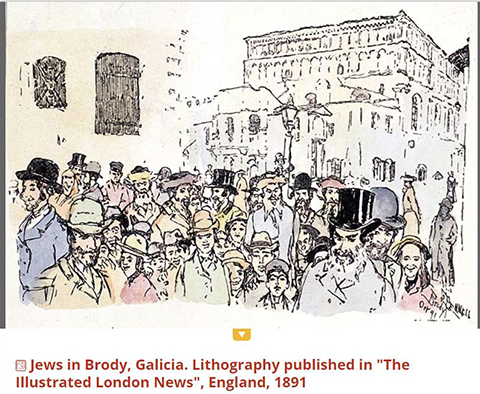
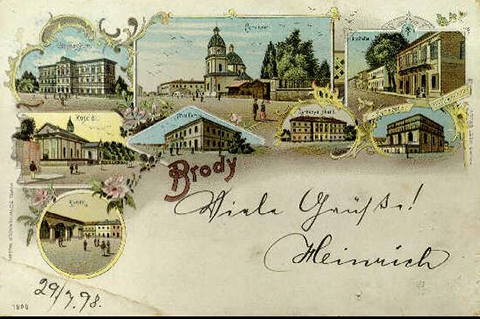
It was during the 1890’s that Bertha left Brody with her husband, Sam Kessler, and set said for the United States. Others from her family left for Brazil.
With everyone who left, by 1910, the Jewish population in Brody shrunk to 12,188.
Religiously during that earlier time-period, 3 different types of Jewish observances were popular:
- Orthodox Judaism was expanded on and encouraged.
- Hasidism started in Galicia by Israel ben Eliezer (c. 1698-1760). Because he married a woman from Brody, he lived there for a while. He became known as Ba’al Shem Tov, the “Master of the good name,”. He proposed that “a person who keeps God in his heart at all times is superior to someone who steeps himself in Talmudic learning in order to enhance his reputation. The Besht believed that worship could best be accomplished through celebration and encouraged singing, dancing, and enjoyment of the fruit of the vine.” https://kehilalinks.jewishgen.org/Brody/brody.htm
- Haskalah, which means “enlightenment,” took hold in late 18th-century Brody, spreading there from Berlin, with which Brody had close commercial ties. The acknowledged father of the Enlightenment was Moses Mendelssohn (1729-1786?), a German Jewish writer and philosopher. “Although Mendelssohn stressed the importance of adhering to traditional Jewish values, he advocated greater participation of Jews in non-Jewish secular life and in the cultural and intellectual milieu of European society.”
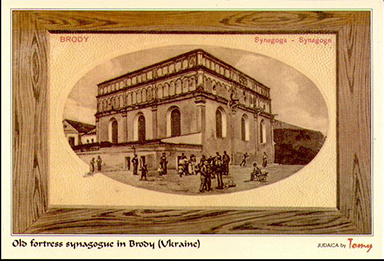
Sources:
- https://www.jewishgen.org/Communities/jgcd.php
- https://kehilalinks.jewishgen.org/Brody/brody.htm
- https://en.wikipedia.org/wiki/History_of_the_Jews_in_Brody
Images:
- Traditional Jewish Dress in 1821
- Lithograph from 1891 Beit Hatfutsot – The Museum of the Jewish People by Joseph Pennell
- Museum: https://www.bh.org.il/
